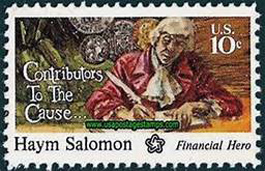By Cantor Sheldon Foster Merel

 ENCINITAS, California — In anticipation of celebrating the Declaration of Independence on July 4th, I did some research about the role of Jews in the Revolutionary War. Besides the well known figure, Haym Solomon, who helped finance the war, I learned that quite a number of Jews played significant roles during the Revolutionary War. Some 100 Jewish patriots although a tiny percentage of the total Colonial population, played a significant role in the war effort.
ENCINITAS, California — In anticipation of celebrating the Declaration of Independence on July 4th, I did some research about the role of Jews in the Revolutionary War. Besides the well known figure, Haym Solomon, who helped finance the war, I learned that quite a number of Jews played significant roles during the Revolutionary War. Some 100 Jewish patriots although a tiny percentage of the total Colonial population, played a significant role in the war effort.
Jews were present at Bunker Hill, Valley Forge, and other battle sites throughout the colonies. Others provided logistical support, finances, and delivered supplies to the troops. Ship owners such as Isaac Moses of Philadelphia outfitted privateers (small fast ships) to run the British blockade, provide necessary provisions to the needy Revolutionary forces, and also succeeded in harassing the British Navy. This was the first time in history since the Jewish exile from Jerusalem that Jews could take their place alongside Christian neighbors as equals in a fight for freedom.
Like other Americans in the colonies, Jews opposed the British Parliament’s excessive taxes. When revolutionary fervor grew after Britain’s imposition of the onerous Stamp Act in 1765, Jewish merchants’ signatures were on various resolutions adopted by individual colonies against the British. As a result many Jewish merchants suffered dislocations, reverses, and some lost their personal fortunes.
Francis Salvador was the first Jew elected to public office in the colonies:, and also the first Jew to die fighting for American independence.
Mordecai Sheftall of Savannah, Georgia, was the head of the local revolutionary committee and responsible for provisioning soldiers. He was appointed Deputy Commissary General for Federal troops, but before the new Congress could approve it he was captured by the British and imprisoned with his son. He was taken to a notorious British prison ship and brutally treated.
Reuben Etting of Baltimore enlisted the moment he heard about the Battle of Lexington and headed north to Massachusetts. He was taken prisoner by the British, and when they discovered he was Jewish, gave him only pork, which he refused to eat. He survived on scraps of food from fellow prisoners. Weakened by such treatment, he died shortly after his release.
His cousin bearing the same name, born in 1762, also fought in the war and was later appointed a United States marshal by President Thomas Jefferson. David Salisbury Franks and Isaac Franks served as officers in the Continental Army. Abigail Minis supplied provisions to American troops in 1779, angering British authorities, and fortunately received permission to move with her daughters to safety in Charleston, South Carolina. She died in 1794 at the age of 94.
Hatred of Jews and imported anti-Semitism from Europe did exist but it did not flourish during the common struggle to separate from the power of England. Finally, Jewish participation in the war did not assure the Jewish population full equal rights or erasure of anti–Semitism. For example,Patrick Henry’s famous words, “Give me Liberty or Give me Death,” were intended for all except Jews, Blacks and Indians.
Haym Solomon, the best-known Jew of his time, began the war as a wealthy merchant and gave the major part of his financial assets to help keep the Revolution going, earning the title “Financier of the Revolution.” Yet after the war he died penniless, as did many of the 56 signors of the Declaration of Independence.
As we celebrate this holiday on July 4th it is appropriate we recall the sacrifices of the 56 men who signed the Declaration of Independence as well as the small but loyal Jewish community.
Happy Fourth of July!
*
Cantor Merel is cantor emeritus of Congregation Beth Israel of San Diego. He may be contacted via sheldon.merel@sdjewishworld.com
Awesome job Sheldon. May we share this through the DAR network?